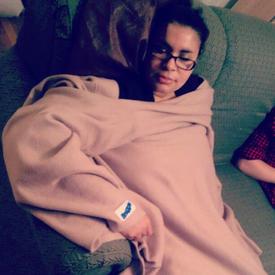Are carbs evil ???
Replies
-
The poor potato...what did it ever do to you?I'd limit eating potatoes if at all possible or eliminate them all together. I was told once that the potato is the devil of all foods
hahaha :laugh:0 -
p.s.> I'd limit eating potatoes if at all possible or eliminate them all together. I was told once that the potato is the devil of all foods when trying to lose weight and it wrecks havoc on your insulin levels for days after eating one.

 0
0 -
Considering you would literally die without carbohydrates, how could they be evil?
Wrong.
Incorrect.
Misleading.
Rubbish.
Bollocks.
Someone literally needs to do some research! :laugh:
http://tinyurl.com/3u6gpuh0 -
I read that everytime you eat carbs, God kills a kitten.
If that were true, there would be a shortage of p*ssy in the world. And there's plenty for all.
=^.^=Meoww!!! Lmao:laugh:0 -
:laugh:p.s.> I'd limit eating potatoes if at all possible or eliminate them all together. I was told once that the potato is the devil of all foods when trying to lose weight and it wrecks havoc on your insulin levels for days after eating one.
 0
0 -
Totally agree. This person has no idea what she's talking about. "I was once told..." Please.p.s.> I'd limit eating potatoes if at all possible or eliminate them all together. I was told once that the potato is the devil of all foods when trying to lose weight and it wrecks havoc on your insulin levels for days after eating one.
please stop with your nonsense
When someone starts with "I was told once" can you really argue that it's nonsense? How would you know what s/he was told? Just sayin.0 -
stick to low GI carbs, works 100% but don't read what's on the pack in the supermarket, this is the only reliable source http://www.montignac.com/en/search-for-a-specific-glycemic-index/0
-
if you are serious about losing weight completely exclude potatoes and bread from your diet because both are junk food, you'd be amazed at the results0
-
I've done unspeakable things to my metabolism through excessive consumption of soda and snack foods from my teens through my 20s. I had bloodwork done recently for insurance and it appears I've undone most of the damage. (Normal glucose levels, LDL/overall cholesterol levels with asterisks next to them saying "below expected range", etc.)
If I eat "all things in moderation" and "restrict calories to a 500/day deficit", I feel hungry all the time.
When I restrict (not eliminate) carbohydrates, my mind clears, I don't feel hungry, I actually eat fewer calories overall, despite my love for bacon.
When I eat a second/third helping of [starchy "good carbohydrate"], I get the absent-mindedness I used to get from drinking half a gallon of Mt Dew and a can of pringles. (It's okay, I'm under 3,000 calories for the day and I rode my bike to work...)
The carbohydrate-induced absent-mindedness is not nearly as bad as how I reacted to the junk food, but it's similar to be sure.
I generally limit myself to 100g of carbohydrates a day and strive to consume 150g of protein (trying to put on some muscle). I don't always succeed. Weight loss plans are like horseshoes and hand-grenades: close is worth some points.
Folks who did not abuse their bodies like I did probably don't have the same reactions to carbohydrates I do. They can probably eat what is commonly known as a "well balanced diet" with no ill effect.0 -
if you are serious about losing weight completely exclude potatoes and bread from your diet because both are junk food, you'd be amazed at the results
WRONG!
Potatoes are a wonderful food. They are packed with a lot of nutrients that are exceedingly good for your body. Bread too is fine in moderation (we could talk about the value of whole grain vs white, but not now).
Here's a quick guide: protein = muscle and tissue regeneration, carbs = quick energy. If I recall my anatomy classes, it is much easier for your body to take carbs and turn them directly into energy than many other foods. Just remember to stay within your calorie limit because the danger is that starchy foods are packed with calories.
Edit: I realize I have GROSSLY oversimplified the roles of proteins and carbs. You can gain energy from protein and you can make new tissue out of veggies, it's just much more efficient to get tissue regen from protein.0 -
My father is diabetic and has changed his diet dramatically, he has taught me so much over the years and almost always about the difference between good and bad carbs. Bad carbs meaning white rice, white pasta, just about anything processed. Good carbs being whole wheats, fruit, veggies and so on. Good carbs metabolize slower in your body making it easier to break down and not to mention are just healthier for you. And of course it's all about proportions, even with good carbs. Hope this helps, it did for me and I was able to make great changes in my diet.0
-
I read that everytime you eat carbs, God kills a kitten.
Love it!0 -
That's not entirely wrong. All carbohydrates turn to blood glucose quickly. In response, your body fires up insulin production to force blood glucose levels down.if you are serious about losing weight completely exclude potatoes and bread from your diet because both are junk food, you'd be amazed at the results
WRONG!
Potatoes are a wonderful food. They are packed with a lot of nutrients that are exceedingly good for your body. Bread too is fine in moderation (we could talk about the value of whole grain vs white, but not now).
Here's a quick guide: protein = muscle and tissue regeneration, carbs = quick energy. If I recall my anatomy classes, it is much easier for your body to take carbs and turn them directly into energy than many other foods. Just remember to stay within your calorie limit because the danger is that starchy foods are packed with calories.
Insulin is "the storage hormone". Your body will force muscle/skin/internal organs to rely on stored glycogen and then force them to consume blood glycogen. If those cells aren't taking blood glycogen fast enough to bring down blood sugar levels, your liver is enlisted to convert that blood glycogen to fat, which is stored under your skin.
Food for thought: The glycemic index (GI) of table sugar is 64. GI of most soft drinks is 63. The GI for shredded wheat cereal is 75. The GI for most store-bought 100% whole wheat breads is 70.
Don't believe the hype.
Most of the nutrients found in potatoes and bread are also found in avocados and olives, which have a super-low glycemic index and, in the case of the avocado, half your daily fiber recommendations.0 -
Like I said, I was grossly oversimplifying.
Plus, gross, avocados. Yuck.0 -
stick to low GI carbs, works 100% but don't read what's on the pack in the supermarket, this is the only reliable source http://www.montignac.com/en/search-for-a-specific-glycemic-index/
besides the fact that GI is mostly irrelevant to the avg person
An 18-mo randomized trial of a low-glycemic-index diet and weight change in Brazilian women
http://www.ajcn.org/content/86/3/707.abstract
Conclusions: Long-term weight changes were not significantly different between the HGI and LGI diet groups; therefore, this study does not support a benefit of an LGI diet for weight control. Favorable changes in lipids confirmed previous results.
Reduced glycemic index and glycemic load diets do not increase the effects of energy restriction on weight loss and insulin sensitivity in obese men and women.
http://www.ncbi.nlm.nih.gov/pubmed/16177201
In summary, lowering the glycemic load and glycemic index of weight reduction diets does not provide any added benefit to energy restriction in promoting weight loss in obese subjects.
Long-term effects of 2 energy-restricted diets differing in glycemic load on dietary adherence, body composition, and metabolism in CALERIE: a 1-y randomized controlled trial
http://www.ajcn.org/content/85/4/1023.abstract?ijkey=57903af923cb2fcdc065ffd37b00a32e22f4c5cf&keytype2=tf_ipsecsha
Conclusions:These findings provide more detailed evidence to suggest that diets differing substantially in glycemic load induce comparable long-term weight loss.
No effect of a diet with a reduced glycaemic index on satiety, energy intake and body weight in overweight and obese women.
http://www.ncbi.nlm.nih.gov/pubmed/17923862
CONCLUSION:
This study provides no evidence to support an effect of a reduced GI diet on satiety, energy intake or body weight in overweight/obese women. Claims that the GI of the diet per se may have specific effects on body weight may therefore be misleading.0 -
Why not get energy from fat, which has -no- effect on blood glucose levels, and therefore no insulin response (and therefore no storage)?Like I said, I was grossly oversimplifying.
Plus, gross, avocados. Yuck.0 -
Why not get energy from fat, which has -no- effect on blood glucose levels, and therefore no insulin response (and therefore no storage)?Like I said, I was grossly oversimplifying.
Plus, gross, avocados. Yuck.
please stop with this nonsense and get informed
from Jamie HaleYou are probably referring to the theory that assumes insulin and blood levels of fat should never be raised at the same time. This theory assumes that insulin is the key contributor to obesity. There are a few things wrong with this line of thought. One of the key problems is not recognizing something called Acylation Stimulating Protein. Acylation stimulating protein (ASP) is a hormone produced by adipocytes and is of importance for the storage of energy as fat. The consumption of dietary fat alone can increase fat storage. Dietary fat affects fat cell metabolism with NO INCREASE in insulin. Some studies have indicated dietary fat loading found a decrease in HSL (hormone sensitive lipase) and an activation of fat storage despite no increase in insulin. The key reason was activation of acylation stimulating protein (ASP) which is activated by the presence of chylomicrons (basically packaged triglycerides that are found in the bloodstream after the meal). ASP increases glucose uptake into the fat cell, increases insulin release from the pancreas and has been described as 'the most potent stimulator of triglyceride storage' in the fat cells by numerous scientists. Another problem with this line of thought is some proteins causes substantial elevations in insulin. Minimal levels of insulin affect fat cell metabolism. Basal levels can decrease lipolysis by 50%.0 -
if you are serious about losing weight completely exclude potatoes and bread from your diet because both are junk food, you'd be amazed at the results
I eat all of the above and I'm very serious about my weight loss....I mean look at my avatar0 -
No kidding!... Stop with the scientific nonsense... I have PROOF!!! Pictures!

See? carbs are evil.
:flowerforyou:0 -
No kidding!... Stop with the scientific nonsense... I have PROOF!!! Pictures!

See? carbs are evil.
:flowerforyou:
Awesome pic!0 -
No kidding!... Stop with the scientific nonsense... I have PROOF!!! Pictures!

See? carbs are evil.
:flowerforyou:
Major kudos. That is an awesome picture.0 -
Genius!!!0
-
they're bad for me just because my body responds very poorly to them (insulin resistance). i have to limit what i eat and most of it, for me at least, should be vegetables (note i said should, lol). however, as others have said, just don't go overboard....they are the main source of energy for your body. maybe try more protein? your body can use that as energy too.0
-
Only 15 carbs a day? My dietician told me 15- 20 carbs for snacks (up to 3 snacks a day) and 45-60 carbs for meals, which makes 240 the most I should have in one day. I wonder if she is wrong and I should use less?0
-
Ketosis is the way forward. so easy0
-
There are good carbs and there are bad carbs....
Focus on complex carbs. Skip refined products, avoid foods where they say 'sugar added' or sugar is one of the first three ingredients, choose whole grains (oats, brans, whole wheat), beans, legumes, fruits & vegetables, etc.0 -
The good carbs are pink, right?
 0
0 -
Time to go fix my Sunday-morning pancake.0
-
 0
0 -
My wife eats a huge amount of carbs everyday and doesn't go over 130 lbs (she is 5 ft 9 in). I eat carbs and pack on the weight. Life just isnt' fair. That example is just anecdotal, but everyone seems to have a different metabolic profile due to a bunch of different factors. Do a lot of research and experiment to find out what works for you.0
This discussion has been closed.
Categories
- All Categories
- 1.4M Health, Wellness and Goals
- 398.5K Introduce Yourself
- 44.7K Getting Started
- 261K Health and Weight Loss
- 176.4K Food and Nutrition
- 47.7K Recipes
- 233K Fitness and Exercise
- 462 Sleep, Mindfulness and Overall Wellness
- 6.5K Goal: Maintaining Weight
- 8.7K Goal: Gaining Weight and Body Building
- 153.5K Motivation and Support
- 8.4K Challenges
- 1.4K Debate Club
- 96.5K Chit-Chat
- 2.6K Fun and Games
- 4.8K MyFitnessPal Information
- 18 News and Announcements
- 21 MyFitnessPal Academy
- 1.5K Feature Suggestions and Ideas
- 3.2K MyFitnessPal Tech Support Questions














